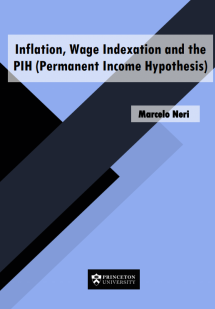
Inflation, Wage Indexation and the PIH (Permanent Income Hypothesis) -
Sobre o paper:
The paper of the thesis studies the effects of inflation and wage indexation on the short run savings behavior of household units. It sets an intertemporal utility optimization framework where individuals face high inflation and a system of wage indexation that restores real earnings values in fixed time intervals. Since no borrowing is allowed, the interaction between the declining path of real earnings between wage adjustments and a standard consumption smoothing process generates a high frequency savings stock. Although this savings stock is expected to be relatively modest (up to one-half of aggregate monthly earnings), it is extremely sensitive to changes in the frequency of wage adjustments.
The main testable result is a demand function for assets that is decreasing with frequency of wage adjustments and increasing with the inflation rates. The paper argues that the recent Brazilian experience presents special features that allow us to estimate this asset demand equation. The key explanatory variable is a description of the Brazilian Wage Law from 1964 to 1989. Furthermore, the four changes in the frequency of wage adjustments that occurred in this period offer an opportunity to analyze the effects of observable switches in the regime of wage indexation (i. e. the micro earnings process) on savings decisions of household units.




